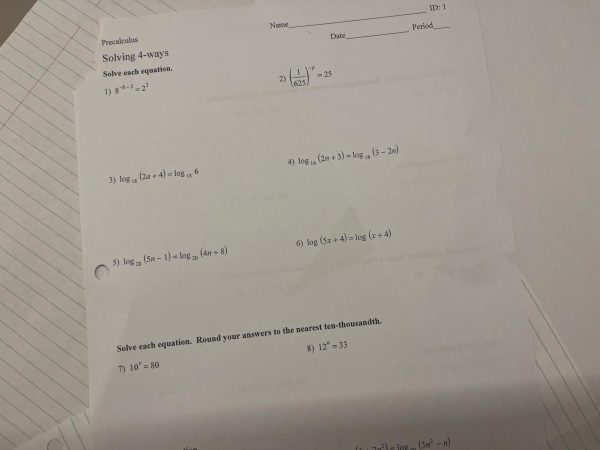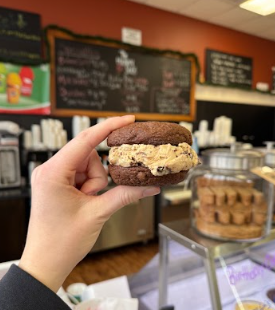Finding Inner Peace Through Meditation
Why Everyone Should Meditate
This photo depicts a piece of artwork that states “The greatest goodness is a peaceful mind,” which highlights one of the main principles of meditation.
Meditation as a practice has deep roots in traditional Eastern culture. Achieving a better link between body and mind has since become common practice in the East. Starting an estimated 4000-7000 years ago, it’s since integrated into Hindu, Sikhi, Buddhist, and Jewish culture before taking over the Western world in the 20th and 21st centuries. Now, because of people like Herbert Benson, Jon Kabat Zinn, and later, Deepak Chopra mindfulness and meditation became very popular among the late 20th century. Now, meditation is common practice for people in Europe and America, and because of the number of people practicing, many companies have started to create tools and services to tap into this new market.
There’s a reason meditation has become so widespread. Meditation has a number of proven benefits to mental and physical psychological health. It can help improve your mental health in many ways, like stress reduction, anxiety reduction, a found increase in happiness, and general promotion of emotional health. Alongside these benefits, meditation can help fight addiction, improve sleep, and may significantly reduce age-related memory loss and fight off dementia. On top of this, a Harvard study has shown that meditation can directly decrease a chemical involved with processing fear.
Despite this, meditation is not without its critics. While some studies try and prove that alongside meditations benefits, there are glaring side effects. Research at the University of Wisconsin-Madison has found that meditation can cause minor physical effects, like headaches, fatigue, dizziness, and weakness, as well as more serious effects, like users possibly reliving traumatic experiences and feeling hypersensitive while meditating. Some critics, like writer Ron Purser, dont necessarily aim to criticize what meditation does, but what it causes its users to not do. Purser argues in his book, McMindfulness, that the modern, Western form of mindfulness and meditation falls flat in achieving the goals that meditation was intended to achieve. He argues that the upper class has distorted meditation in the West, benefitting them more than anything else. Meditation is seen as a way we can personally take control of our stress, but this may keep people from trying to find their source of stress and prevent future stress. This can possibly allow companies to get away with worse working conditions because now, the resulting stress from work is the worker’s responsibility to keep under control, not the owner’s responsibility to prevent. Purser even goes on to describe mindfulness and meditation as “Social-Control” and “Self-Pacifaction”.
Although some criticize the practice, many people in our community meditate and can give personal accounts on its successes. Pennridge High School student Nicola Reid says, “I’ve found inner peace.” Nicola goes on record saying she hasnt experienced any noticable negative effects from meditating. Nicky is a dancer and has said that its helped with her dancing, and could see how other sports and activities could benefit from regular meditation. The practice is “So simple, yet so impactful”, she says. Another local, Emma White, who is a regular meditator talked a lot about the benefits she saw, and the lack of downsides. Saying “Im so much calmer in moments I would have freaked out before.” She also noted a lack of anxiety since she started meditating. Emma goes onto say that everyone can find benefits from meditation. “It could be for everyone. You just have to find your way.” Most of her success is from “sitting down and being in the present, and mostly focusing on breathing” and “Focusing on the moment.”
Over the thousands of years of humans meditating, its benefits are explicit. From its beginnings in China, India and Japan, to its commercialization in the 21st century, meditation maintains its status as a clearly benficical practice. While it may prevent us from making change, and balancing the power structures that are causing us stress, it’s still an easy method to come more into touch with your body.
Sources:
“Home — McMindfulness.” McMindfulness, https://ronpurser.com/about. Accessed 17 March 2023.
“How Many People Meditate In The World? – Learn More on Mindworks.” Mindworks, 24 April 2022, https://mindworks.org/blog/how-many-people-meditate/. Accessed 17 March 2023.
“Maum Meditation.” Do Meditation, https://www.do-meditation.com/maum-meditation.html. Accessed 17 March 2023.
Mead, Elaine. “The History and Origin of Meditation.” PositivePsychology.com, 27 May 2019, https://positivepsychology.com/history-of-meditation/. Accessed 17 March 2023.
Powell, Alvin. “Harvard researchers study how mindfulness may change the brain in depressed patients.” Harvard Gazette, 9 April 2018, https://news.harvard.edu/gazette/story/2018/04/harvard-researchers-study-how-mindfulness-may-change-the-brain-in-depressed-patients/. Accessed 17 March 2023.
Ross, Ashley. “Meditation History: Religious Practice to Mainstream Trend.” TIME, 9 March 2016, https://time.com/4246928/meditation-history-buddhism/. Accessed 17 March 2023.
White, Marney A. “Benefits of Meditation: 12 Science-Based Benefits of Meditation.” Healthline, https://www.healthline.com/nutrition/12-benefits-of-meditation#10.-Helps-control-pain. Accessed 17 March 2023.
Joe Pearson, Grade 12. Interests/hobbies include cello, philosophy, jazz piano, music theory, and relaxing with friends and family. Joe hopes to attend...
Isabella White, Grade 12. Interests/hobbies include Mini-THON, buildOn, Key Club, NHS, Student Council, working two jobs, hanging out with friends and...





